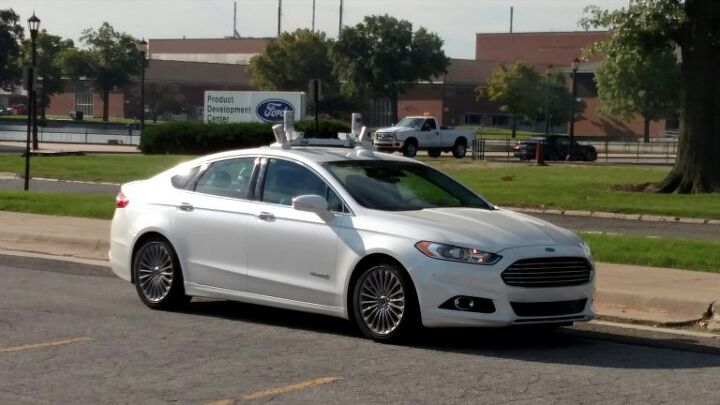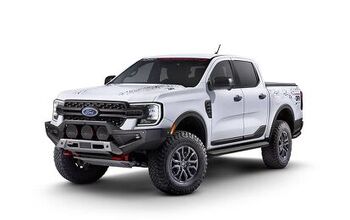For All Its Talk of Mobility, Ford Says It's Fine With FCA and GM Leading the Robocar Pack

If recent statements from Ford Motor Company were any indication, you’d think we were living in some futuristic society where our grandparents drove Nucleons and the need for a personal vehicle was almost nil. Yes, too much “mobility” talk gets under the skin.
That said, it’s Ford’s domestic rivals who are actually building and fielding production vehicles that drive themselves — and setting up businesses and partnerships that could make the automakers a bundle on the side. By next year, both General Motors and Fiat Chrysler could have self-driving vehicles roaming America, earning their companies money.
Be our guest, Ford claims. There’s bigger things to worry about.
Speaking to Bloomberg, Ford’s vice president of autonomous vehicles and electrification, Sherif Marakby, said being first in the autonomous field is pointless if the venture doesn’t bring home the bacon.
“We certainly do not feel behind on getting to a profitable business,” Marakby said. “It’s a lot more than just a car and the software that goes into the car. We’re building a business. How we’re going to generate the revenue and profits matter more than just jumping in and running a business someplace.”
The past month brought big news for GM and FCA. GM’s self-driving vehicle division, Cruise, saw a $2.25 billion cash injection from Japan’s SoftBank to expedite autonomous Chevrolet Bolt production. (Much of the funding hinges on the ride-hailing service reaching the market next year.) Fiat Chrysler, which teamed up with Google subsidiary Waymo ages ago, saw an order for 62,000 autonomous Chrysler Pacifica Hybrids for its partner’s ride-hailing business. This could be worth $2.5 billion for the automaker.
Already, there’s Waymo-operated minivans driving around in select test markets. Sometimes they have trouble merging. For both Cruise and Waymo, 2019 is the target year for public consumption. Ford’s autonomous offering isn’t expected until 2021.
This doesn’t mean the Blue Oval hasn’t left the starting line, as recent partnerships with Domino’s and Postmates say otherwise, but the company wants a standalone AV model designed from the ground up — not just a rejigged passenger car or van. The key to profitability is designing a multi-role vehicle that stays in service all day and night, Marakby claims.
“With ride-hailing there are peaks and valleys in the day, so we’re thinking about filling all the gaps, all the valleys, for these expensive assets,” the executive said. “You’ve got to focus on maximum utilization. We’re really laser focused on the ultimate goal of profitable miles and utilization to get to profitable AVs in 2021.”
Whether or not Ford’s plan is the more sensible solution, investors don’t seem that enthusiastic about what they’re hearing. The company’s stock has seen a little upward movement since February, but remains stubbornly depressed — especially when you consider Ford’s supposedly forward-thinking abandonment of all but one car model.

More by Steph Willems
Latest Car Reviews
Read moreLatest Product Reviews
Read moreRecent Comments
- MaintenanceCosts If you want a car in this category, you want interior space, comfort, predictability, and low running costs.That probably favors the RAV4 Hybrid, with second place going to the CR-V hybrid. The CR-V is a nicer-looking and nicer-feeling product, but it just has not proved quite as low-drama as the Toyota.The RAV4 Prime is a compelling car but it's extremely expensive and still hard to get, and the regular hybrids are a better value.There's no reason to choose the non-hybrid of either one. You get higher running costs and less refinement for no benefit.
- Aaron Id lean towards the rav4. The crv1.5 turbo has had issues. The rav 4 has both port and direct injection, no cvt. Also the Toyota hybrid systems have been super stout
- Jeff My wife owned a 2013 AWD CRV since new it has been trouble free but I am not a fan of turbos so I would lean toward the Rav 4. If I were getting a hybrid it definitely would be a Rav 4 with Toyota's hybrid system being the best. Honestly you could not go wrong with either a CRV or a Rav 4. My third choice would be a Mazda.
- 3-On-The-Tree We like our 2021 Rav4 non hybrid.
- Vatchy FSD never has been so what is with the hype about robo-taxis? You would need the first in order for the second to work.


































Comments
Join the conversation
Wait until the case law is settled on the liability of a driverless car having a high-profile accident. Then the issue will either be more or less attractive for big potential players. Ford may not want to put the whole company on the line for an unknown risk/reward proposition.
"By next year, both General Motors and Fiat Chrysler could have self-driving vehicles roaming America, earning their companies money." Uh, no, they will not.